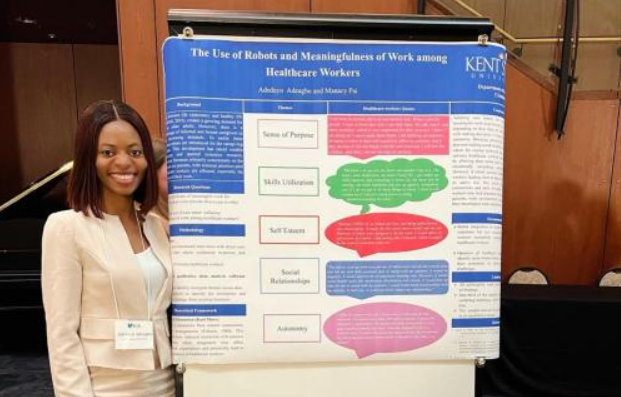The popularity and acceptance of artificial intelligence have ballooned in recent years due to the advent of generative AI, which makes content creation easier in a world obsessed with media consumption. However, there are pathways of using artificial intelligence that have received less acceptance and scrutiny, especially in the healthcare sector.
An emerging use of AI in healthcare is the possibility of using robots and other AI in improving the quality of care received by older citizens. This is not a major conversation in Africa at the moment since it is currently rated as the world’s youngest continent with 40% of its citizens below the age of 15.
There has been a significant increase in life expectancy in developed countries due to research, technological advancement and improved standard of living. In fact, in some of the senior living facilities, there are people in their 90s and above 100. However, there is a lag between life expectancy and healthy life expectancy. People are living longer but not living healthier.
In other words, they live longer but require care in their old age.
Advertisement
But due to demographic changes, there is a shortage in the availability of caregivers, both family and paid. To alleviate these challenges and meet the need for caregiving for older adults, the use of artificial intelligence, specifically robot caregivers, has been introduced. Some are used to entertain senior citizens and alleviate loneliness, while others provide cognitive and physical support, and still others focus on safety.
AI is also already being widely used to improve care for older adults via the use of wearable sensors for fall detection, pill dispensing, remote care and telemedicine, to name a few. Nevertheless, the use of care robots has raised the most concerns due to ethical reasons.
The use of AI in healthcare has not become a mainstream conversation in developing countries, in Nigeria and other sub-Saharan African countries, due to limited infrastructure and investment in healthcare.
Advertisement
Adedayo Adeagbo, an alumnus of the University of Ibadan and a doctoral candidate in Medical Sociology at Kent State University, is researching the impact of AI tools on healthcare workers.
She has been named an Ohio Scholar in ageing, a recognition awarded to future leaders shaping policy and innovation in the care of older populations. Her research, which has been presented at major conferences and cited in public policy conversations, uses narrative analysis and sociological theory. She gives voice to those navigating the subtle and not-so-subtle costs of automation in the caregiving of older adults.
“Technology should support, not replace, the human wisdom, empathy, and judgment essential to caregiving,” she says.

Adeagbo says AI can be deployed to provide healthcare services in Nigeria despite the limited infrastructure.
Advertisement
“I think AI may be even more useful in developing countries where access to emergency services may not be readily available. It may also be very useful considering the shortages of trained healthcare professionals. AI can be used for the early detection of diseases. They can help health workers diagnose conditions like dementia or diabetes and support chronic disease management through reminders and predictive monitoring. The use of fall detectors and GPS trackers may also be very useful to monitor the health of older adults who live by themselves,” she opined.
“The use of AI in caring for older citizens can be effectively adapted in Nigeria and other sub-Saharan African countries. However, this will not be a one-size-fits-all situation; it has to be sensitive to the needs and culture of the environments within which they are deployed. Although the use of care homes is not widely adopted in most of these countries, with the current demographic shifts and children living very far away from their parents, the need for paid caregivers, in and outside of the home, may become a norm soon. Therefore, the use of cost-effective and economical AI may be inevitable.
“With widespread mobile phone use, AI tools such as voice assistants, SMS-based health reminders, and mobile diagnostic apps can support caregivers and extend healthcare access. These technologies can aid overburdened health workers, assist with early detection of diseases, and help governments plan better through data-driven insights. While challenges like unreliable electricity, internet access, and limited local data exist, they can be mitigated through solar-powered devices, offline-compatible systems, and culturally relevant AI design.”
Adeagbo’s work challenges the idea that efficiency should come before empathy.
Advertisement
“My study found that the use of robots could be potentially useful to alleviate some of the challenges and burnout experienced by healthcare workers due to shortages; however, they should not be deployed for direct care. They can help with laundry, cleaning, taking calls or doing all the other duties that take up time but not direct care. Healthcare workers reported that the use of robots may potentially negatively impact the meaningfulness of their work and may result in alienation. More importantly, it threatens the loss of empathy and compassion in care, which is the most integral element in the caring process, if left to machines.
“Conversations about artificial intelligence are no longer abstract,” she explains. “They are shaping who gets care, how it is delivered, and whether older adults are seen as fully human in systems increasingly run by algorithms.”
Advertisement
Her approach is intersectional and inclusive, paying attention to how race, gender, class, and cultural norms affect ageing experiences in both the global north and south. She is part of a new generation of Nigerian scholars using their diasporic presence to shape ethical innovation and elevate global justice.
Advertisement
Views expressed by contributors are strictly personal and not of TheCable.











